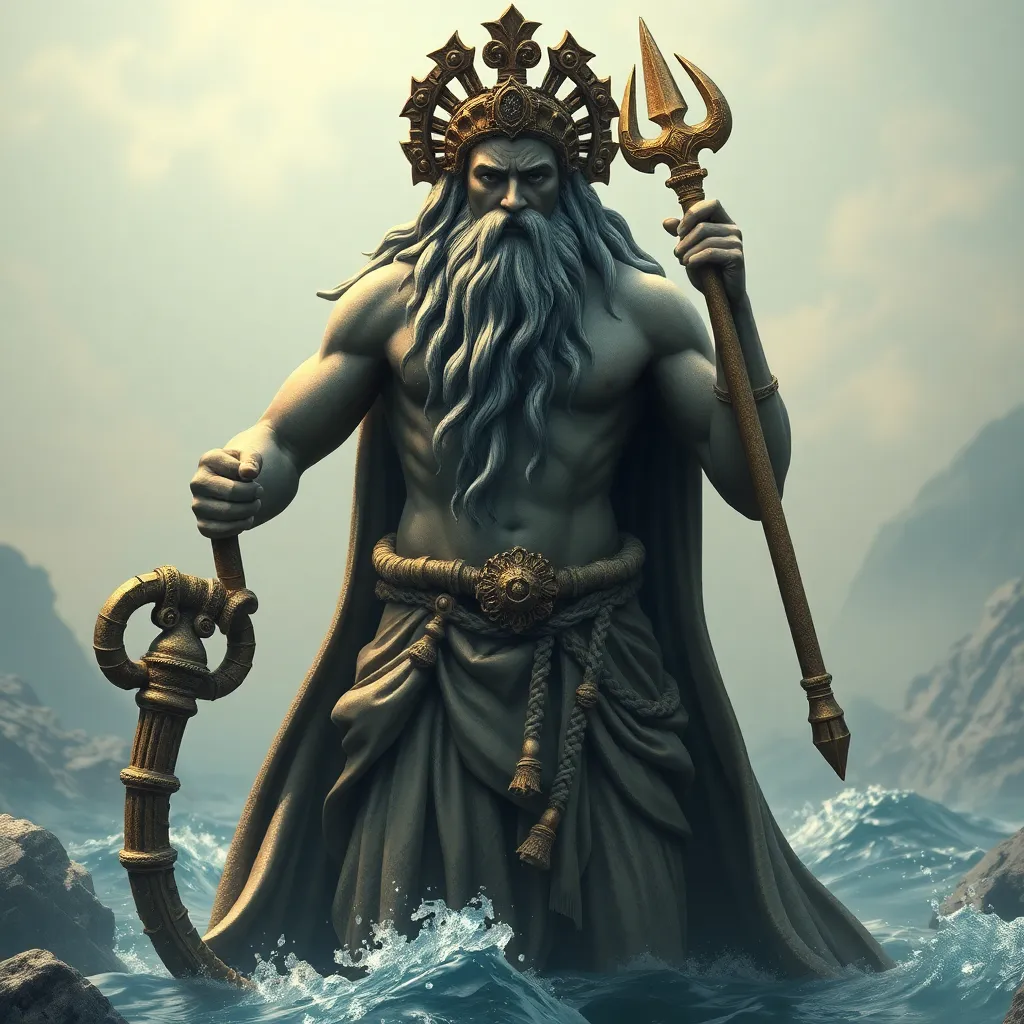The Role of Poseidon in the Myths of the Underworld
I. Introduction
In Greek mythology, Poseidon is one of the most significant Olympian gods, revered as the god of the sea, earthquakes, and horses. His influence permeates various aspects of ancient Greek life, from navigation to agriculture. However, the Underworld, a realm of the dead ruled by Hades, also plays a crucial role in mythological narratives. This article explores Poseidon’s influence and role in Underworld myths, examining the intricate relationships between the sea god and the chthonic realms.
II. Poseidon: The God of the Sea
Poseidon is often depicted with a trident, a three-pronged spear symbolizing his dominion over the oceans. His other attributes include:
- Horses: He is credited with creating the first horse.
- Earthquakes: Known as the Earthshaker, he could cause land to tremble.
- Sea Creatures: Poseidon is closely associated with marine life.
As one of the twelve Olympian gods, Poseidon holds a significant place in the pantheon. He is often seen as a rival to Zeus, the king of the gods, with whom he shares a complex relationship. While his primary domain is the sea, it is essential to note that his influence occasionally extends into the Underworld, although he is not one of its primary rulers.
III. The Underworld: A Brief Overview
The Underworld in Greek mythology is a complex and often feared realm. It is where souls go after death, ruled by Hades, who governs alongside his queen, Persephone. Key figures associated with the Underworld include:
- Hades: The god of the Underworld and ruler of the dead.
- Persephone: The queen of the Underworld, representing the cycle of life and death.
- Charon: The ferryman who transports souls across the river Styx.
The Underworld is structured into various regions, including the Elysian Fields for the blessed, Tartarus for the wicked, and the Asphodel Meadows for ordinary souls. Its significance in myth underscores the ancient Greeks’ beliefs about death, morality, and the afterlife.
IV. Poseidon’s Connection to the Underworld
While Poseidon is primarily the god of the sea, several mythological tales link him to the Underworld. One of the most prominent connections is the symbolism of water, which serves as a boundary between the living and the dead. The river Styx, a critical element in Underworld myths, is a waterway that souls must cross to reach their final resting place. Poseidon’s role as the god of water gives him a unique relationship with this realm:
- Water as a symbol of transition: In many myths, water signifies purification and passage.
- Facilitator of passage: Poseidon’s dominion over water allows him to influence the journey of souls.
Thus, while he does not govern the Underworld, Poseidon plays an essential role in the broader mythological landscape concerning the afterlife.
V. Poseidon and Chthonic Deities
In mythology, chthonic deities are gods associated with the earth and the Underworld. Poseidon, while primarily a sea god, shares some characteristics with these deities:
- Relationship with Hades: Though often seen as rivals, Poseidon and Hades share the responsibility of overseeing the afterlife.
- Other chthonic gods: Poseidon has connections with deities like Hecate and Demeter, especially in the context of nature and the cycles of life and death.
This relationship highlights the interconnectedness of the various realms within Greek mythology, where gods often overlap in their domains and duties, creating a complex web of interactions.
VI. Notable Myths Involving Poseidon and the Underworld
Several myths illustrate Poseidon’s connection to the Underworld:
- The story of Poseidon and the Cyclopes: In this myth, Poseidon aids the Cyclopes, who are often depicted as working in the Underworld.
- The myth of Theseus and the Underworld: Poseidon plays a role in the adventures of Theseus, particularly in his descent into the Underworld.
- Poseidon’s involvement in the tale of Orpheus: Orpheus’s journey to the Underworld to retrieve Eurydice highlights Poseidon’s influence over the waters that separate the living from the dead.
These myths not only showcase Poseidon’s multifaceted nature but also illustrate the fluidity of boundaries between the sea and the Underworld.
VII. Interpretations of Poseidon’s Role in Underworld Myths
Thematic analysis of Poseidon’s involvement in Underworld myths reveals several interesting insights:
- Duality of Poseidon: He embodies both the life-giving aspects of the sea and the death-related elements of the Underworld.
- Cultural significance: Poseidon’s role reflects ancient Greek beliefs about the interconnectedness of life and death.
- Legacy: His influence continues to be felt in modern interpretations of mythology and storytelling.
Poseidon, as a figure who navigates both realms, symbolizes the cyclical nature of existence, where life and death are inextricably linked.
VIII. Conclusion
In summary, Poseidon plays a multifaceted role in Underworld myths, illustrating the interconnectedness of Greek deities and their domains. His influence extends beyond the sea, touching upon the mysteries of life and death, and highlighting the complex relationships within the pantheon. The enduring legacy of Poseidon in mythology reminds us of the rich tapestry of narratives that explore the fundamental questions of existence, making him a timeless figure in Greek lore.




